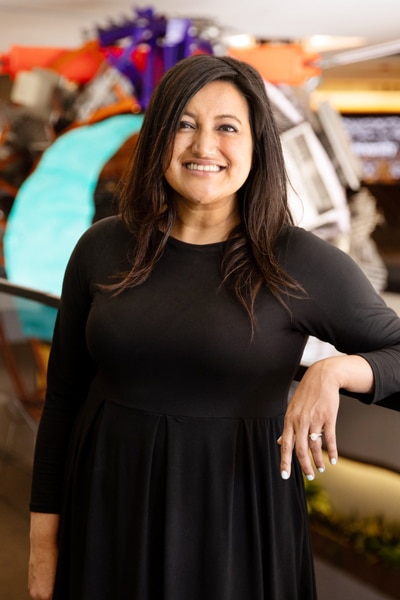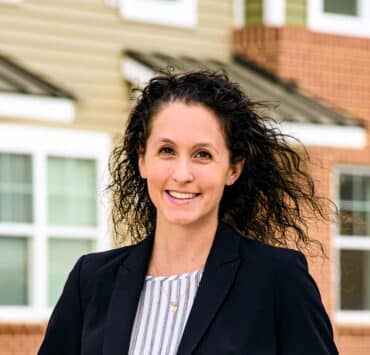|
Getting your Trinity Audio player ready...
|
Rita Srivastava’s decision to attend law school shocked her parents. “My sister is a doctor, and they thought I would follow the same path. For a while, I felt like the black sheep of the family,” she says with a laugh.
Her parents emigrated to the US before she was born. “My father believed that if you worked hard, there would be no barriers to success. And my mother thought a solid education would give children—especially girls—a way to succeed in this country,” Srivastava says. As a first-generation Indian American, she grew up with a foot in both cultures—adapting to American customs but nourishing her roots at home and in the local Indian community.
“We grew up with the idea that we were very lucky—a safe and stable home, plenty of food, and a good education—and that led to the idea of performing service to others,” she recalls. “And that can become part of your life.”
While earning her BA in English at the University of Michigan, Srivastava fell in love with the legal field. “At Michigan, I talked extensively with students already in law school and others whose parents were lawyers,” she says. The Center for Wrongful Convictions at Northwestern University’s Pritzker School of Law was a key player in persuading then-governor George Ryan to issue a moratorium on executions in Illinois in 1999. “That appealed to my sense of advocacy,” Srivastava says, “and the more I learned about Northwestern, the more I wanted to go there.”
She did go, and her on-campus experiences included studying employment law and taking both an externship with the Chicago office of the EEOC and a summer internship in New York City with the global law firm Paul Hastings. She’d go on to work as a labor and employment attorney for Paul Hastings after she finished law school; three years later, she was hired for a similar position at Morgan, Lewis & Bockius in Chicago. Her pro bono work there focused on two key areas: “We represented asylum seekers and ‘dreamers’ who were covered by DACA and explored the racial justice angle in wrongful-conviction cases,” she says.

In 2016, Srivastava was at a crossroads: she had to decide whether to pursue a partnership track at Morgan Lewis or pursue a senior counsel opportunity at McDonald’s. The quick-service giant was already a client at Morgan Lewis, so she was already somewhat familiar with its operations. She took the role as senior counsel in their global labor and employment group for a variety of reasons: her ability to make an impact as a woman of color; her own emphasis on diversity, which she felt McDonald’s shared; and the experiences of a former colleague who went in-house to McDonald’s, who touted the depth and breadth of the work.
Her responsibilities there are far-ranging, including the management of a large docket of employment-related claims across the US, overseeing litigations and cooperating with outside counsel to mitigate brand damage, consulting on the rollout of products that will impact employees, and training and other activities that enhance the employee experience.
Her team interfaces broadly across the company—HR, operations, communications, government relations, digital initiatives, and other business functions. “McDonald’s is huge, and when you factor in the range of local, state, and national laws—as well as the global impact—that affect us, we are always learning,” she says.
As companies across the world step up their efforts to increase diversity, equality and inclusion (DEI), McDonald’s has done the same, Srivastava says. Through its legal DEI committee, the company has committed to the goals of the Mansfield Rule: Legal Department Edition (MRLD). This two-year program requires legal departments to consider lawyers from various underrepresented groups for 50 percent of its significant positions. “That includes women, racial or ethnic minorities, LGBTQ+, those with disabilities, and others,” she says.
The legal department also participates—along with two law firms—in Diversity Lab’s “Move the Needle Fund,” in which two first-year law students from underrepresented groups spend their summers working at the firm and with the McDonald’s legal department.
Srivastava’s commitment to advocacy extends to her history of taking pro bono cases. “I’ve been fortunate to work for companies that supported this activity,” she says. “At my private practice firms, it counted as billable hours. And McDonald’s has a pro bono committee that continually shares opportunities for legal professionals to get engaged in a wide variety of areas.”
Her proudest achievement with pro bono work, she says, was helping secure the 2019 release of Demond Weston, a man who had served twenty-nine years of a seventy-five-year sentence for murder. “I started working on this case when I was at Morgan Lewis, and stayed with it even after joining McDonald’s. We wanted to preserve continuity in the case, and I did so with McDonald’s blessing and constant support,” she says.
During the COVID-19 pandemic, Srivastava worked from home while caring for her infant son. “This gave me a different view on work and motherhood,” she says. “Now I understand how people feel when going on leave as well as the process of coming back.” An empathetic and understanding boss sharing her experience —and support from a number of colleagues—made it easier to navigate these issues. “That’s why policies and leadership should involve people with differing perspectives and life experiences. You come up with solutions that make the most sense.”
***
Sanchez & Amador:
“Rita Srivastava has deep knowledge of employment law and McDonald’s and is laser focused on obtaining the best results for the company and its employees. My employment litigation team loves working with her for those reasons and because Rita goes out of her way to ensure we achieve great results together.”
–Richard S. Amador, Managing Partner

